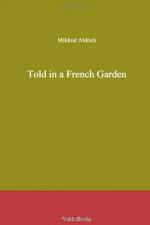As it died away into the distance, as if its spirit, barely audible, were translated to the far off heavenly host, I strained my hearing to catch that “last fine sound” that passed so gently one “could not be quite sure where it and silence met,” and for the first and last time in my life I had known all that a violin can do.
For a moment the hush was wonderful.
Rodriguez stood like a statue. His bow still touched the strings. Yet there was no sound that one could hear, though his own fine head was still bent, as though he, too, listened.
He gently dropped his bow—he smiled—we all came back to earth together.
Then such a scene followed as beggars description.
But he passed hurriedly out of sight, and no amount of tumult could induce him to even show himself again.
Slowly, reluctantly, the audience dispersed, still murmuring. The musicians picked up their traps, and wildly or soberly according to their temperaments, began to dispute. It was everywhere the same topic—the unknown work that Rodriguez had so marvellously played.
As for me—as he played, I seemed to be in the very heart of the melody, singing it too, as his violin sang it. As the song soared upward, my heart was filled with longing, with pain, with joy, with regret. As it gradually died into silence a mist seemed to pass from before my eyes, and I became suddenly conscious of the sweet face of my beloved, growing more and more distinct, until, as the last note died away, I was fully conscious that the music had passed between us, like a cloud, to obscure my sight utterly, and to recede as slowly, leaving her face before me.
I knew afterward, that, to all appearances, I had been gazing directly into her face all the time.
Through it all I had a vague sense that what he played was not new to me. It seemed like something I had long known and tried to say, but could not.
In a daze, I left the stage. Silently I put my violin in its case, pulled on my great coat, and turned up the collar about my face. I was sure I was haggard, and I did not wish her to remark it. I knew that I should find her waiting in the corridor with her father.
Just as I passed out of the artists’ room, I was surprised to see Rodriguez standing there in conversation with her, and her father. He was, however, just leaving them, and did not see me.
I knew that her father had known him in Vienna, when the now great violinist was a mere lad, and I had heard that he forgot no one, so the sight gave me a merely momentary surprise.
As I joined her, and we stepped out into the night together, I could not help wondering if Rodriguez had noticed her sensitive violin face, as I tried to get a look into her eyes. I remembered afterward that, so wrapped was I in my own emotions, and so sure was I of her sympathy, that I neither noted nor asked how the music had affected her.




